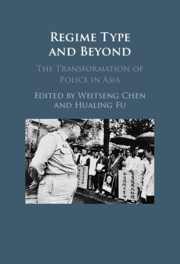89 results
Away from Grass-roots? The Irony of the Chinese Rural Legal Service
-
- Article
-
- You have access
- HTML
- Export citation
Part V - Conclusions
-
- Book:
- Regime Type and Beyond
- Published online:
- 25 May 2023
- Print publication:
- 08 June 2023, pp 343-386
-
- Chapter
- Export citation
Part II - Authoritarian Policing: Past and Present
-
- Book:
- Regime Type and Beyond
- Published online:
- 25 May 2023
- Print publication:
- 08 June 2023, pp 51-166
-
- Chapter
- Export citation
Index
-
- Book:
- Regime Type and Beyond
- Published online:
- 25 May 2023
- Print publication:
- 08 June 2023, pp 387-394
-
- Chapter
- Export citation
Tables
-
- Book:
- Regime Type and Beyond
- Published online:
- 25 May 2023
- Print publication:
- 08 June 2023, pp viii-viii
-
- Chapter
- Export citation
Part IV - The Singapore and Hong Kong Exceptions
-
- Book:
- Regime Type and Beyond
- Published online:
- 25 May 2023
- Print publication:
- 08 June 2023, pp 265-342
-
- Chapter
- Export citation
1 - Mapping the Authoritarian and Democratic Divide
- from Part I - Framework
-
-
- Book:
- Regime Type and Beyond
- Published online:
- 25 May 2023
- Print publication:
- 08 June 2023, pp 3-25
-
- Chapter
- Export citation
Part III - Democratic Transition and Authoritarian Resilience
-
- Book:
- Regime Type and Beyond
- Published online:
- 25 May 2023
- Print publication:
- 08 June 2023, pp 167-264
-
- Chapter
- Export citation
Copyright page
-
- Book:
- Regime Type and Beyond
- Published online:
- 25 May 2023
- Print publication:
- 08 June 2023, pp iv-iv
-
- Chapter
- Export citation
Part I - Framework
-
- Book:
- Regime Type and Beyond
- Published online:
- 25 May 2023
- Print publication:
- 08 June 2023, pp 1-50
-
- Chapter
- Export citation
Figures
-
- Book:
- Regime Type and Beyond
- Published online:
- 25 May 2023
- Print publication:
- 08 June 2023, pp vii-vii
-
- Chapter
- Export citation
3 - High Policing and Human Rights Lawyering in China
- from Part II - Authoritarian Policing: Past and Present
-
-
- Book:
- Regime Type and Beyond
- Published online:
- 25 May 2023
- Print publication:
- 08 June 2023, pp 53-86
-
- Chapter
- Export citation
Contents
-
- Book:
- Regime Type and Beyond
- Published online:
- 25 May 2023
- Print publication:
- 08 June 2023, pp v-vi
-
- Chapter
- Export citation
Abbreviations
-
- Book:
- Regime Type and Beyond
- Published online:
- 25 May 2023
- Print publication:
- 08 June 2023, pp xiii-xiv
-
- Chapter
- Export citation
Contributors
-
- Book:
- Regime Type and Beyond
- Published online:
- 25 May 2023
- Print publication:
- 08 June 2023, pp ix-xii
-
- Chapter
- Export citation

Regime Type and Beyond
- The Transformation of Police in Asia
-
- Published online:
- 25 May 2023
- Print publication:
- 08 June 2023
2 - Pro Bono, Legal Aid, and the Struggle for Justice in China
- from Part I - Access to Justice in Asia
-
-
- Book:
- The Role of Lawyers in Access to Justice
- Published online:
- 29 September 2022
- Print publication:
- 06 October 2022, pp 19-38
-
- Chapter
- Export citation
Of Judge Quota and Judicial Autonomy: An Enduring Professionalization Project in China
-
- Journal:
- The China Quarterly / Volume 251 / September 2022
- Published online by Cambridge University Press:
- 24 March 2022, pp. 866-887
- Print publication:
- September 2022
-
- Article
- Export citation
Chinese Courts and Criminal Procedure: Post-2013 Reforms Edited by Björn Ahl Cambridge: Cambridge University Press, 2021 288 pp. £85.00 ISBN 978-1-1088-3330-1
-
- Journal:
- The China Quarterly / Volume 249 / March 2022
- Published online by Cambridge University Press:
- 25 March 2022, pp. 294-296
- Print publication:
- March 2022
-
- Article
- Export citation
Showcase of Authoritarian Legality and Its Potential Erosion
- from Part II - Authoritarian Legality
-
- Book:
- Authoritarian Legality in Asia
- Published online:
- 14 July 2020
- Print publication:
- 16 July 2020, pp 61-140
-
- Chapter
- Export citation

